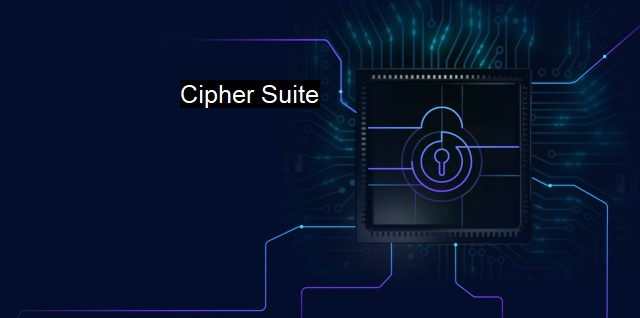What is Cipher Suite?
Cipher Suites: Laying the Foundation for Data Security and Authenticity in Cybersecurity Protocols
A "cipher suite" is a well-defined combination of algorithms that help facilitate the security elements of a network connection, and plays an integral role in cybersecurity in various ways. Cipher suites are applied whenever an encrypted connection is established, helping to ensure that any data exchanged over this connection cannot be intercepted and read by unauthorized entities.The term "cipher-suite" represents a conglomeration of various encryption elements, provided by lower-level protocols like the Transport Layer Security (TLS) or its predecessor Secure Sockets Layer (SSL). These protocols operate beneath the Hypertext Transport Protocol Secure (HTTPS) to secure connections to websites.
Cipher suites generally consist of key exchange algorithms, bulk encryption algorithms, as well as message authentication codes (MACs). The key exchange algorithm outlines how cryptographic keys are swapped between the client (e.g., web browser) and server. Such algorithms allow both parties reckoning a shared secret that no other party can predict, even if they can see the exchanged data. Diffie-Hellman (DH), Ephemeral Diffie-Hellman (DHE), and RSA are common examples of the key exchange mechanism.
The bulk encryption algorithm operates on the main data or 'the bulk of the data'. It uses the shared secret to modify the data in a way such that any party lacking the shared secret cannot discern any meaningful value from it. Examples of this include the Advanced Encryption Standard (AES), the Data Encryption Standard (DES), and RC4.
Lastly, MACs check the integrity of the information being transferred. They provide a form of validation for the data received by a party, confirming that it arrived as intended without alteration. Hash-based MAC (HMAC) is a common example of this functionality.
Subject to the specific configurations of the client and server, a cipher suite can vary in potency. To ensure optimal security, modern cipher suites employ forward secrecy, also known as Perfect Forward Secrecy (PFS). PFS ensures that even if the private key of the server is compromised, past encrypted sessions cannot be decoded. By creating a separate private key per session, the damage from a potentially compromised key is kept minimal.
Cipher suites occupy a fundamental role in securing internet-based connections and transactions. They are employed in securing various browsers, email clients, Virtual Private Network (VPN) clients, amongst other tools used to commute data over the internet. When sensitive data is transmitted in something as simple as making a purchase on an e-commerce site or reading personal emails, it’s protected by cipher suites helping in confronting the risk posed by potential information hackers or data snoopers.
Awareness and understanding of cipher suite workings are critical for anyone related to information technology industries and cybersecurity. antivirus software also actively involves cipher suites to secure any data that is sent to or from servers for analysis. For instance, when an antivirus program sends data for cloud scanning to assess any threats, these connections must also be encrypted to ensure sensitive data is not divulged publicly. Only then can the effectiveness of the antivirus programs guaranteed.
Benefits of cipher suites extend to the point of enabling privacy, security, and performance in applications. To maximize protection, companies and individuals should carefully consider which cipher suites are allowed, which should promptly lead to the choice to update or sunset older, less secure suites.
To sum up, a cipher suite is an essential armory in the digital world, which works behind the scenes to safeguard the security and privacy of day-to-day online activities. Advancements continue to be made in this field, inspiring more robust and faster cipher suites that keep up with the increasingly sophisticated approaches cybercriminals are utilizing. Although they might appear overwhelmingly complex, they are greatly beneficial hence the need to become familiar with their workings, strengths, and potential drawbacks.

Cipher Suite FAQs
What is a cipher suite in cybersecurity?
In cybersecurity, a cipher suite refers to a combination of cryptographic algorithms that are used to secure data transmission between two devices or networks. It determines the type of encryption and authentication methods used to protect the data.Why is a cipher suite important in antivirus software?
Antivirus software uses cipher suites to establish secure connections with servers for downloading updates and definitions. A strong cipher suite is important to ensure that the communication channel between the antivirus software and server is not intercepted or compromised by a hacker or a cybercriminal.What are some popular cipher suites used in cybersecurity?
Some popular cipher suites used in cybersecurity include RSA, AES, 3DES, and TLS.Can a weak cipher suite make a system vulnerable to cyber attacks?
Yes, a weak cipher suite can make a system vulnerable to cyber attacks. An attacker can intercept the communication and decrypt the data if the cipher suite is not strong enough. Therefore, it is important to use a strong cipher suite when transmitting sensitive information over the internet.| | A | | | B | | | C | | | D | | | E | | | F | | | G | | | H | | | I | | | J | | | K | | | L | | | M | |
| | N | | | O | | | P | | | Q | | | R | | | S | | | T | | | U | | | V | | | W | | | X | | | Y | | | Z | |
| | 1 | | | 2 | | | 3 | | | 4 | | | 7 | | | 8 | | |||||||